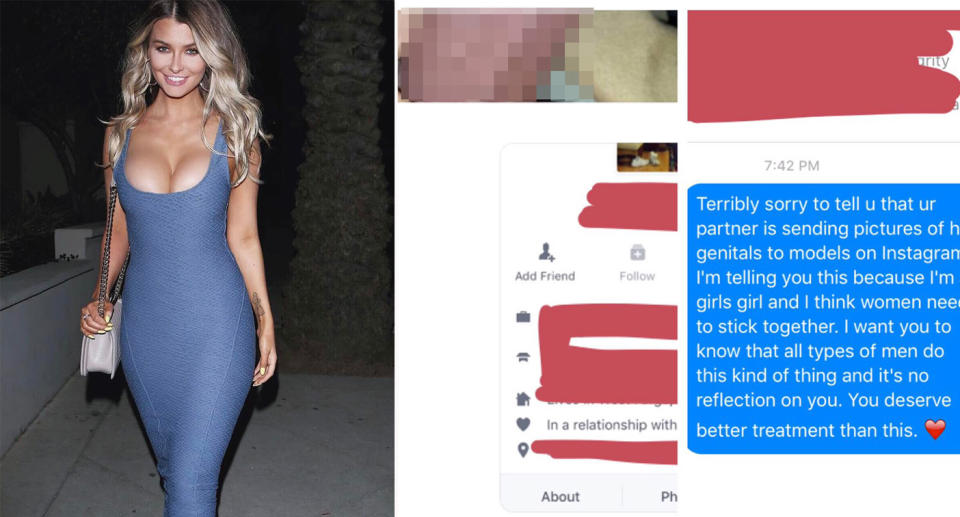'It's a gateway': Calls to criminalise sending unwanted nude photos
If you flash someone your naughty bits in public, you could be fined or even face jail time. But do it online and the penalties probably won’t be so stiff.
Like it or not, the ‘d**k pic’ has become a cultural phenomenon that arouses a multitude of feelings and responses, with many women taking to publicly shaming senders after receiving the unwanted imagery.
Such is the scale of the problem that in 2016 an artist turned her collection of unsolicited pics into a public show aptly titled “I Didn't Ask for This: A Lifetime of D**k Pics”.
Some people even make a game of ‘AirDropping’ nude pictures to nearby strangers on public transport.
Exposing yourself in public can lead to serious consequences, but do it in the digital realm and it’s not so clear. But increasingly, lawmakers around the world are looking to do something about that dichotomy.

This year Texas outlawed sending unwanted nude photos to people through dating apps, or other digital means, making it a misdemeanour crime with a fine of up to $A730.
Now a Californian senator has teamed up with female-friendly dating app Bumble promising to introduce legislation in January that would also make the act illegal in California.
“It’s a gateway to more extreme forms of harassment and abuse and it should not be taken lightly, and it deserves consequences,” Bumble CEO Whitney Wolfe said.
Earlier this year, Bumble was one of several dating apps to begin using artificial intelligence to detect nude photos. The app will blur the images and give the recipient a chance to view it or delete it. Users can also report the person who sent it.
Sending unsolicited dick pics in now illegal in Texas! But if you have a small one will they throw the case out cuz of lack of evidence? #TeamDl
— DL Hughley (@RealDLHughley) November 9, 2019
The Texas law, and the forthcoming legislation in California, attempts to put digital flashing more on-par with its real world counterpart.
In NSW, for instance, the law on obscene exposure states a “person shall not, in or within view of a public place or school, wilfully and obscenely expose his or her person”. The maximum penalty for this offence is a six-month term of imprisonment and/or a fine.
While malicious sexting was made illegal in Victoria all the way back in 2014, such laws largely relate to sending images of other people.
If it’s your own body, so long as you stop short of harassing someone with a carrier service, it remains somewhat of a grey area.
‘Letting their gender down’
Dr Andrea Waling from the Australian Research Centre in Sex, Health and Society is the author of White Masculinity in Contemporary Australia: The Good Ol’ Aussie Bloke, and conducts research on the gender and social dynamics of d**k pics.
She is quick to point out the different meaning and function the sending of such images can have in different communities, and believes that all too often the act is viewed through a solely heterosexual paradigm.
In researching the issue, she said a majority of the discussion centres on either “shaming the male body, or highlighting the important experiences of women who receive d**k pics in harmful and threatening ways”.
On social media, many cheered the decision in Texas to legislate against sending such unwanted imagery, but Dr Waling cautioned that it shouldn’t be universally condemned.
“I think what surprised me was that there were a couple of articles by women who openly spoke about how broader perceptions and framings of d**k pics made them feel shamed and embarrassed for liking them, and feeling as though they were letting their gender down,” Dr Waling told Yahoo News Australia.
“We need to move away from this idea that heterosexual women are only ever interested in emotions and romance. Some want to express a more raunchy and hedonistic sexuality, and we need to create a safe space for that.”
Women have worked hard to decriminalise their bodies, such as the Free the Nipple movement and championing breastfeeding in public, Dr Waling noted. Turning around and outlawing d**k pics “could have consequences for those important gains”.

‘It’s just normal’
NSW teenager Ruby De Rover, finished high school in 2018 and believes all girls above year nine at her school would have received an unsolicited nude picture.
Speaking to the ABC earlier this year, she recalled how she was 15 when she first got an unwanted image sent to her on Instagram.
“There was no introduction, no message, just a 'd**k pic',” she said.
“It's come to a point where it's just normal and a part of what happens.”
The issue presents an array of issues for parents, teachers and policy makers – particularly given the young nature of participants, raising issues of child pornography.
Provided the sender and receiver are adults, it might be deemed inappropriate, in poor taste or worse. And like former New York congressman Anthony Weiner, it might even cost you your job, but should it cost you more than that?

Criminalisation not necessarily the answer
A 2018 YouGov poll in the UK found that 41 per cent of young women had received unsolicited sexual images, of whom 23 per cent said they found it distressing and 17 per cent said they found it threatening.
It’s figures like that which led British member of parliament Maria Miller last year to call for stronger measures against those who use technology to send sexual images following an inquiry into sexual harassment in public places.
However legislation in these situations is often forced to play catch up.
“Criminalising doesn’t understand that d**k pics may function in different ways, and the law would have to be very specific as to what constitutes a harmful photo and the manner in which it’s sent,” Dr Waling said.
“What do we do if a teen boy sends a d**k pic to his mates, as young men might do as part of friendship and bonding? It’s not within a sexual context, but should he be charged with an offence? How will the law capture that complexity?”
Dr Waling acknowledged that unwanted d**k pics were “sadly a very common experience” among women and condemned those sent in inappropriate contexts, but said “sending d**k pics can be a fun and exciting and sexy activity” among consenting adults.
Do you have a story tip? Email: newsroomau@yahoonews.com.
You can also follow us on Facebook, Instagram and Twitter and download the Yahoo News app from the App Store or Google Play.




